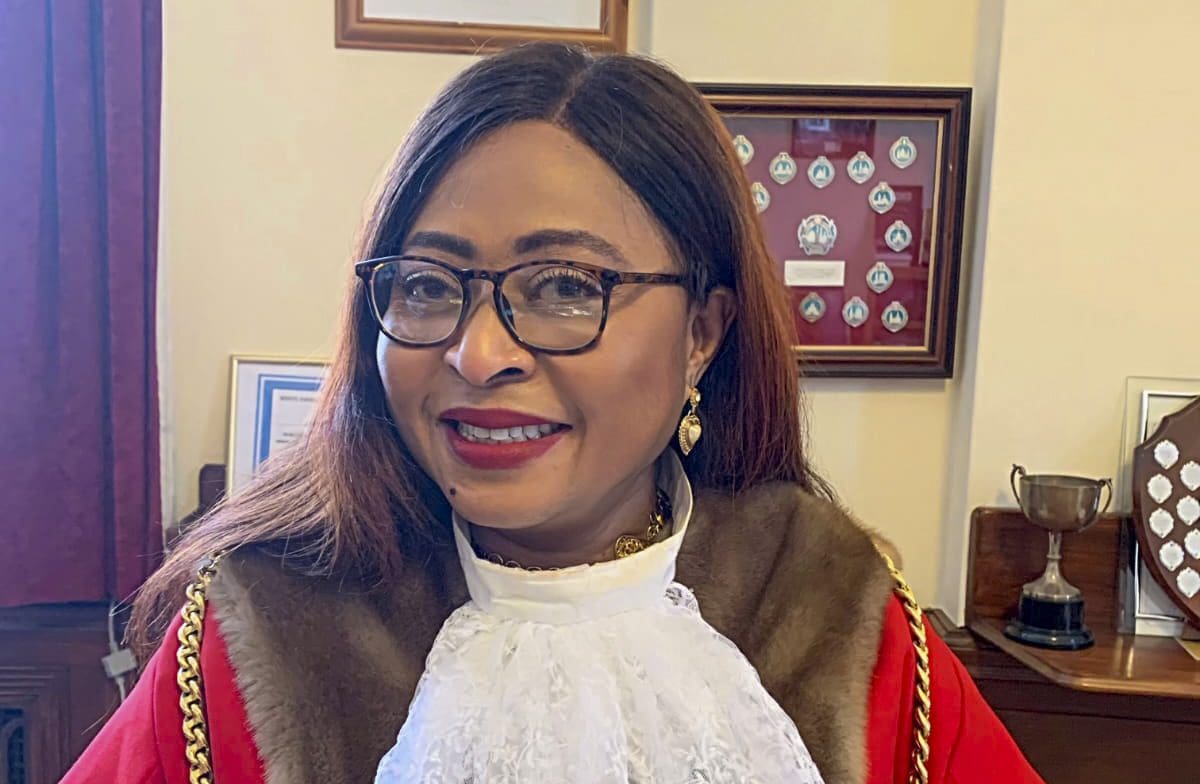She may have been unexpectedly thrust into the role of Mayor of Luton, but it seems public service comes naturally to Maria Lovell – an honorary Royal in her native Ghana in recognition of her work to promote the traditional Kente fabric that is as much a part of the heritage of the West African country as hats are to her adopted home town of Luton.
Ever since she moved here to study at university, Maria has celebrated and promoted her Ghanaian heritage through cultural events and exhibitions, including the Luton International Carnival, and through her efforts was coroneted as the first Kente Development Queen for Bonwire, a town in the Ashanti region of Ghana renowned for the royal Kente cloth, and as Custodian for the UK and Ireland, in light of her work to highlight the importance and showcase the symbolic cloth.
Maria explained more: “I’ve always been proud of Ghana and although I have lived here for longer than I lived in Ghana, I have always wanted to learn and share as much as possible our culture and traditions. Kente cloth is the traditional fabric of Ghana and now globally weaves the world symbolic of black cultural heritage. It was reserved for Royalty and very special occasions and each family could commission their own design and colours which had meanings. It’s similar to tartan among the Scottish clans.
“Although it is easier to get hold of these days, it was very expensive and rare back in my mother’s day and she used to tell me that she had one, very special kente that she would wear for weddings and special occasions. She was always lending it out to other women in the neighbourhood because they didn’t have their own.
“I love those kinds of stories and I’ve always wanted to share that, and forge links between my home country and Luton.”
Her life here took an unexpected turn in September when, as Deputy Mayor, she moved into the position of Mayor when her predecessor Tahir Malik resigned after being found to have breached COVID-19 guidelines.
Her diary of public engagements had been busy anyway as Deputy Mayor including creating the Deputy Mayor’s Appreciation Awards to recognise local BAME businesses during Black History Month; hosting Afternoon Tea to celebrate Older Persons Day in 2019 and launching the Luton Women’s Network during celebration of International Women’s Day in March; but moved to a new level when she found herself in the new role, the first black woman of African descent and, of course, the first to be formally appointed in a virtual online ceremony.
“That is the way our lives work now,” she said. “I have grandchildren and they keep me right on the technological side. I hadn’t even heard of Zoom in March, and now it’s a way of life for us.
“From speaking to businesses locally, I know that it is maybe one of the positives to come out of the pandemic – that they have found ways to meet and work that doesn’t involve all the travelling and expense they had before, and maybe won’t go back completely to that way of working.
“But we have a lot of work to do to help the local economy. We have the Luton Investment Framework, an ambitious plan for major town wide transformation which with our partners is on course to secure £1.5bn in investments to transform the town, creating around 18,500 new jobs by 2040 for local people. Obviously, the coronavirus situation hasn’t helped at all, but the Council is moving ahead positively, to ensure that the town gets the support it needs to bounce back.
“Government packages have helped, and the Luton Council continues to support in any way we can, our fantastic airport which supports the town immensely has been very badly hit, and a night-time economy has been devastated. Hopefully by driving investment and bringing jobs to the town, jobs for local people, we can bring life back to the areas that have been so badly impacted this year.”
And it isn’t just the business community that is high on Maria’s list of priorities. She has long championed the inclusiveness of diversity and broad cultural heritage of the local population and hopes that can continue during and, in particular, after the worst of the pandemic, when people can begin to come together again. There has also, of course, been the issues of the disproportionate risks to the BAME community from coronavirus.
“Luton is a wonderful town with a rich industrial and cultural history and is super diverse– I believe there are 102 different languages spoken in Luton, and it’s a broad faith community,” she said. “So much work has been done to celebrate that and to bring people together and to address inequalities.
“People obviously haven’t been able to come together physically, not the way they used to due to the pandemic but I also think that what we have all been through this year has changed our perspectives.
“I think people have become more kinder and a bit more interested in their neighbours and their local community. People slowed down, they weren’t just working and living any more, and had time and reason to make sure the people on their street were safe and well bringing back a sense of community belonging “
“And that’s important with the effect all this is having on mental health. For some people it’s just missing things like having somewhere to go during the day, to dress up and go out and see people. When we can’t do those things, sometimes our mental health suffers and we all have to look out for one another.
“In many different ways we have to find a means of healing, restoring and rebuilding our town and communities. Our town has a rich history and fantastic things to be proud of and together, I’m sure we can do it.”














